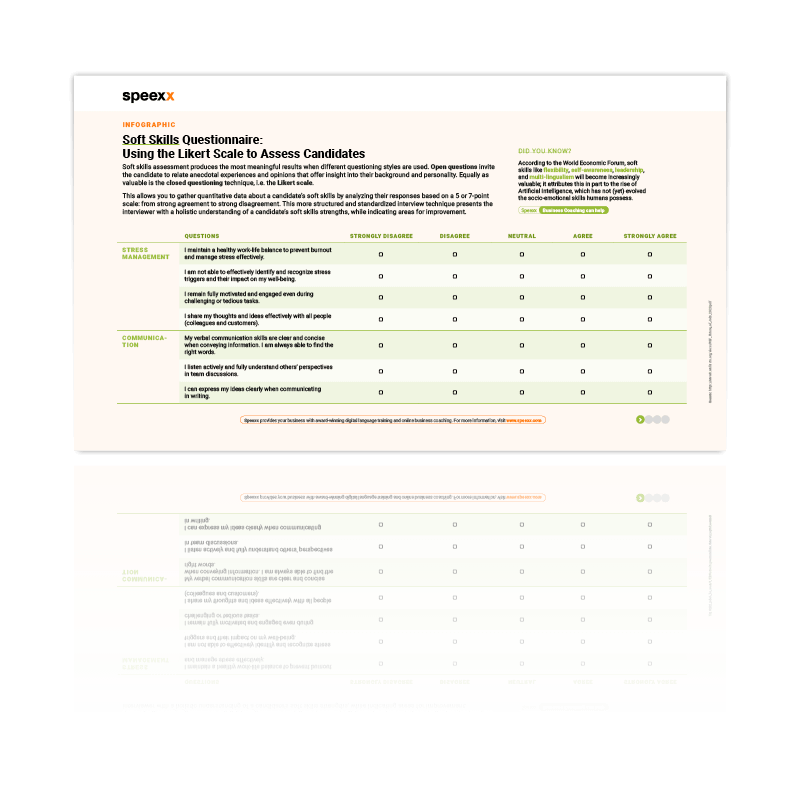Digital transformation has reinvented the way we work. With automation software and artificial intelligence, human labor has become increasingly flexible and agile, allowing us to collaborate across continents and time zones using digital tools. Digitalization has dismantled traditional systems, granting people more autonomy, resulting in more frequent job changes, and giving rise to new roles that demand a different set of skills. This article explores the relevance of interpersonal skills in the digital age and how to foster them.

What Are Interpersonal Skills?
Interpersonal skills, also known as people skills, are soft skills that enable us to effectively interact with others. These skills help build relationships and are essential in both professional and social settings. Not just in the workplace, interpersonal skills form the foundation for successful teamwork, trust, and harmony in any kind of group interaction. The most crucial interpersonal skills include:
- Communication
- Empathy
- Teamwork
- Conflict management
- Building trust
- Ability to give and receive feedback
- Negotiation skills
- Adaptability

How to Identify the Soft Skills Your Company Needs
Effective Communication and Interpersonal Skills in the Virtual Space
Interpersonal skills become even more critical when communication occurs digitally rather than face-to-face. Remote work not only provides employees with greater flexibility but also transforms how we exchange ideas and collaborate with colleagues, often across great distances. One challenge in virtual communication is the absence of non-verbal cues, which can easily lead to misunderstandings. To support team cohesion and create a positive work environment, even when not sharing a physical office, it is crucial to practice soft skills such as active listening and conflict resolution. Below, we outline the key areas where interpersonal skills play a vital role in the digital workplace and how they can be nurtured.
1. Emotional Intelligence: The Foundation of Strong Interpersonal Skills in the Digital Workplace
The term “emotional intelligence,” or EQ, was coined in the mid-1990s by American psychologist and journalist Dr. Daniel Goleman. EQ refers to the ability to recognize, understand, and appropriately respond to one’s own emotions as well as the emotions of others. A person with high emotional intelligence can manage their emotions, even in stressful or tense situations, helping to prevent or defuse conflicts and contribute to a positive work environment. Employers highly value emotional intelligence, and according to the World Economic Forum’s “Future of Jobs 2023″ report, it is one of the top 10 key skills for employees. To cultivate emotional intelligence, mindfulness practices and end-of-day reflections on one’s emotions and reactions can be helpful.
1. The Role of Interpersonal Skills in Virtual Collaboration
Emotional intelligence isn’t just about understanding one’s own emotions—it also involves understanding the emotions of those we work with. Virtual teams, in particular, benefit from interpersonal skills, which help build strong and trusting relationships, fostering effective collaboration and creativity. Empathy, active listening, and constructive conflict resolution are essential in these environments. Since face-to-face interactions are rare or non-existent in digital workspaces, it’s even more important to develop a deep understanding of others to ensure that shared goals are met.
2. Leadership and Interpersonal Skills in a Digital Context: The Future of Leadership
Managing a team in a digital workplace presents its own set of challenges for leaders. Since leadership shapes company culture, it’s essential for leaders to set a good example by incorporating interpersonal skills into their leadership style. This fosters clarity and trust, helping team members feel comfortable approaching their manager despite the physical distance. Leaders can use interpersonal skills to guide their teams through complex situations, cultivating an authentic leadership style in the digital space. Another key aspect of emotional intelligence in leadership is the willingness to learn, especially in the fast-paced digital environment where innovations frequently emerge.
3. Intercultural Collaboration and Interpersonal Skills in the Digital Workplace
Organizations that operate virtually are often highly diverse, bringing together people from different countries, languages, and cultures into one team. Generational differences also come into play; for instance, Gen Z tends to work differently to Baby Boomers. Thanks to growing DEI (Diversity, Equity, and Inclusion) initiatives, many companies now benefit from global, multiethnic teams that bring varied perspectives and ideas. Interpersonal skills are key to developing intercultural sensitivity, enabling successful virtual collaboration with colleagues from other countries. It can be helpful to learn about different working styles, such as how explicit or implicit a particular language may be. A leader with emotional intelligence will consider both cultural and generational differences, leveraging employees’ strengths while addressing their unique needs.

Who Benefits from Interpersonal Skills?
Cultivating interpersonal skills offers numerous benefits. Gaining respect from colleagues by staying calm in chaotic situations is one such advantage. People with strong interpersonal skills approach conflicts or disagreements with a calm and positive attitude, seeking to find a common solution. Customer relationships also improve with enhanced relationship management, ultimately boosting the company’s reputation. Overall, interpersonal skills help individuals become better colleagues or leaders in the digital workplace by promoting open, clear, and friendly communication, even across physical distances. These skills boost team morale and productivity, positively impacting the company’s overall performance. Additionally, a positive work environment contributes to higher employee retention.

Use the Likert Scale to Assess Candidates' Soft Skills
Nurturing Interpersonal Skills in the Digital Workplace
Cultivating interpersonal skills is something every company should prioritize, especially those with digital work environments. Remote work is here to stay, so it’s essential to embrace this trend while maintaining a transparent work culture, even when employees no longer share the same physical space. Employers are increasingly recognizing the value of soft skills for business success and are placing a strong emphasis on emotional intelligence, particularly in leadership roles.
As a result, many companies are now widely using business coaching to help employees refine their soft skills, ensuring they are equipped to navigate the complexities of modern work environments. The digital workplace offers a unique opportunity to further develop these skills. As virtual work continues to rise, interpersonal competencies will become even more critical, especially in relation to artificial intelligence.